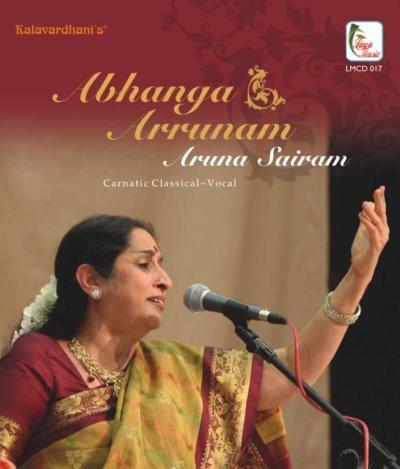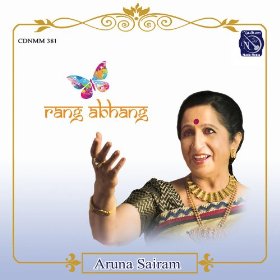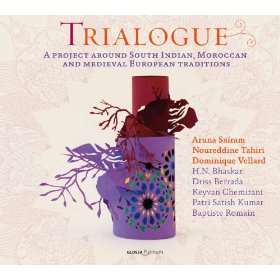'Both Hindustani and Carnatic music are timeless in their own way': Aruna Sairam
-
While Hindustani and Carnatic music follow the same pillars of raga and taal, their aesthetic is different. So, why not enjoy both as way they are, instead of trying to compare and see which is better, she adds
Recently awarded the Chevalier de l’Ordre National du Mérite, the Knight of the Order of the Merit by the French government, for her singing prowess and contribution to the development of Indo-France relations, legendary Carnatic vocalist Aruna Sairam feels “euphoric” at the recognition, further describing her journey that began in the 1980s as “surreal”.
“I’m very euphoric. In fact, every award gives you waves of satisfaction, joy, and happiness that somebody out there is recognising your work. I also would like to look back on all those years of travelling to Europe and performing in all those countries, including France, during my initial years. I used to carry a big tambura with me then, and used to just travel and perform in a sari. It all seems surreal now. But, it’s all coming together now, and it’s being recognised. That makes me very happy,” recollects Aruna, 70, opening up about her first visit to Europe where she went to teach music in a conservatory for three months as a visiting faculty, and gradually started to perform too.
Each award holds a special place in her life, says Aruna. “Awards mean a lot to me. And I am sure it means a lot to audiences. There comes a time when exhaustion overpowers or you are confused as an artiste as music is uncharted territory. Each artiste’s journey is like uncharted territory. I feel awards at any time, have a lot of meaning. But it also gives me a sense of responsibility, because I know that I cannot afford to give in to that confused state of mind ever. That responsibility also helps artistes like me to keep going,” Anura tells indianexpress.com in an exclusive video interaction.
Ask her about the renewed interest in music nowadays, with many young artistes also leaning towards learning classical, Aruna says it is a good and a positive change as long as the child is let free to enjoy music without being burdened by expectations.
“The fact that today children are learning music, the fact that parents can afford to put their children in music is great. As a teacher, and as an artiste, I would say that one primary reason why music is wonderful for a child to pursue is that it completely re-orients the child’s mind and emotions. It makes the worldview different. I feel every child should experience music, one way or the other. The problem begins when the child is burdened with targets and expectations. The whole exercise gets skewed. Let the child enjoy music and fall in love with it. While it is very important to learn and understand music, it is also extremely important to not be competitive at a very early age,” Aruna expresses.
On being asked about her views on reality shows that often pit one child’s talent against the other, Aruna says, “As far as they give exposure, they are good. But if the competitive bid or the appreciation is overdone, it gives a wrong perception to the child about themselves.”
Her zeal and passion to teach her art made her become part of Artium Academy, a music school, as a faculty to “pass on her legacy, knowledge, and passion for music to aspiring students through specially designed courses”.
“Artium has got carefully chosen teachers with sensitivity to give lessons to children. Our team does live sessions, and also one-on-one sessions to give student more clarity. I have had the opportunity to create the curriculum and interact with other teachers. I share my learning with them in the form of masterclasses and train them for their work ahead. I am amazed at these young teachers and their pursuit to excel and teach others. Today, the young people are extremely intelligent, hardworking, and enterprising,” says Aruna.
Emphasising on the core values of structured learning and daily practice, Aruna says that one can constantly raise the bar. “Solid grounding is necessary. For us to be confident of what we are doing, whether Carnatic, Hindustani, Bollywood, Hollywood, Tollywood, or any kind of music, structured learning is the basis of it all. You are at the cutting edge above those who don’t have it, which is why you should have that training. That has to be backed by practice. Whatever is being taught has to be revised at least for half an hour every day. Just doing that can take you to great lengths of proficiency,” Aruna, who does “sadhana (practice) every day with a mandatory three-hour routine to prepare my mind, body and voice for the life that I am in”, adds.
The self-confessed film buff and bookworm calls greats like MS Subbulakshmi, and Lata Mangeshkar as “legacy creators” from whom there is still so much to learn. “Even if you would sit with one song of Lata Mangeshkar at one time, and just give it silent listening, there is so much to appreciate, learn and be inspired and immerse ourselves,” says Aruna, further sharing that an autobiography of hers is in the works. “I’m seriously considering it. So it should happen very soon,” she says.
Aruna takes pride in the fact that no country in the world can boast of two major classical music systems — Hindustani and Carnatic, and by that fact, there is no comparison between the two which is often a matter of debate in the music circles. “Carnatic is the music that comes from the southern part of India with certain aesthetics, priorities, and approach to life, considering the culture is different. Similar is the case with Hindustani music, that comes from the Northern part. While both see the same pillars of raga and taal, the aesthetic is different. So, why not enjoy both as way they are, instead of trying to compare and see which is better. Both are timeless in their own way,” Aruna concludes.
Related Albums

Abhanga Arunam
Published : 1994
By : Kalavardhini's
Rang Abhang
Published : 2011
By : Nadham Music Media
Trialogue
Published : 2012
By : Glossa Music
Related Concerts
- Bolava Vitthal - Celebrating Ashadhi Ekadashi An Evening of Abhangs
On : Friday, July 27, 2018
